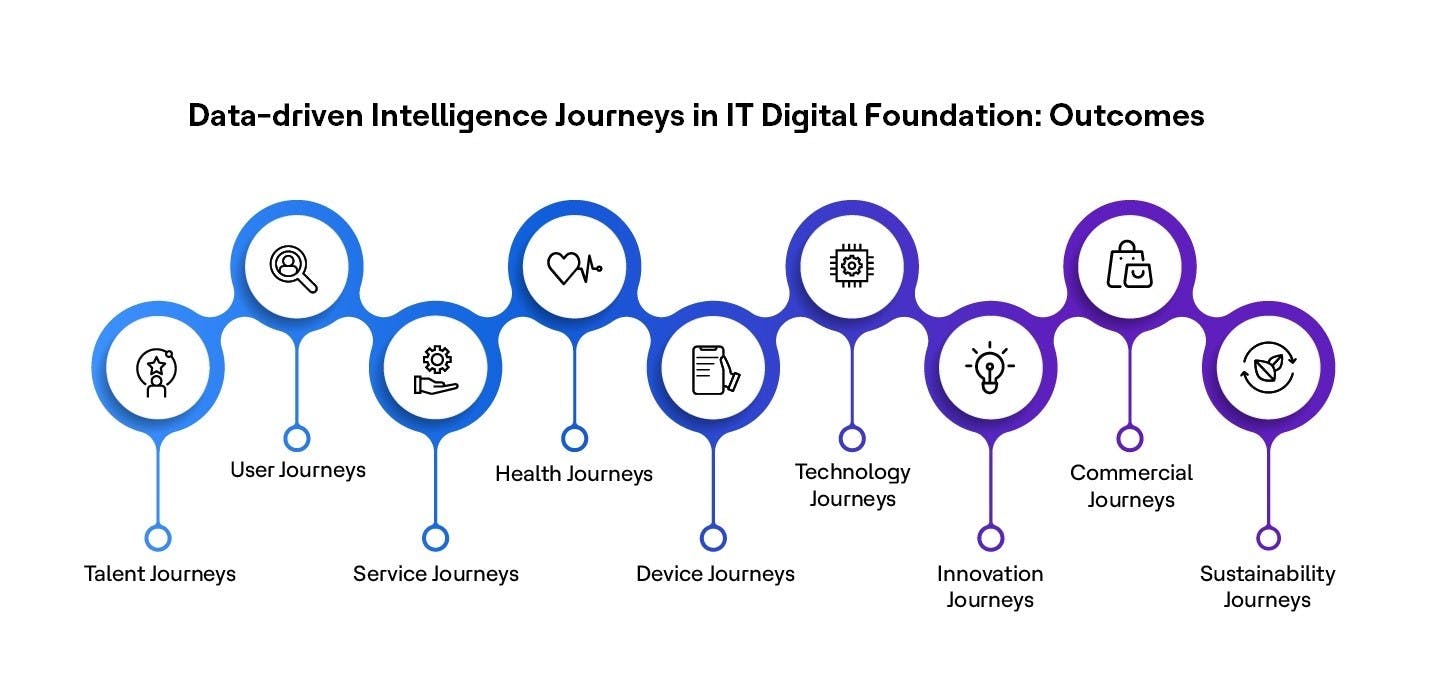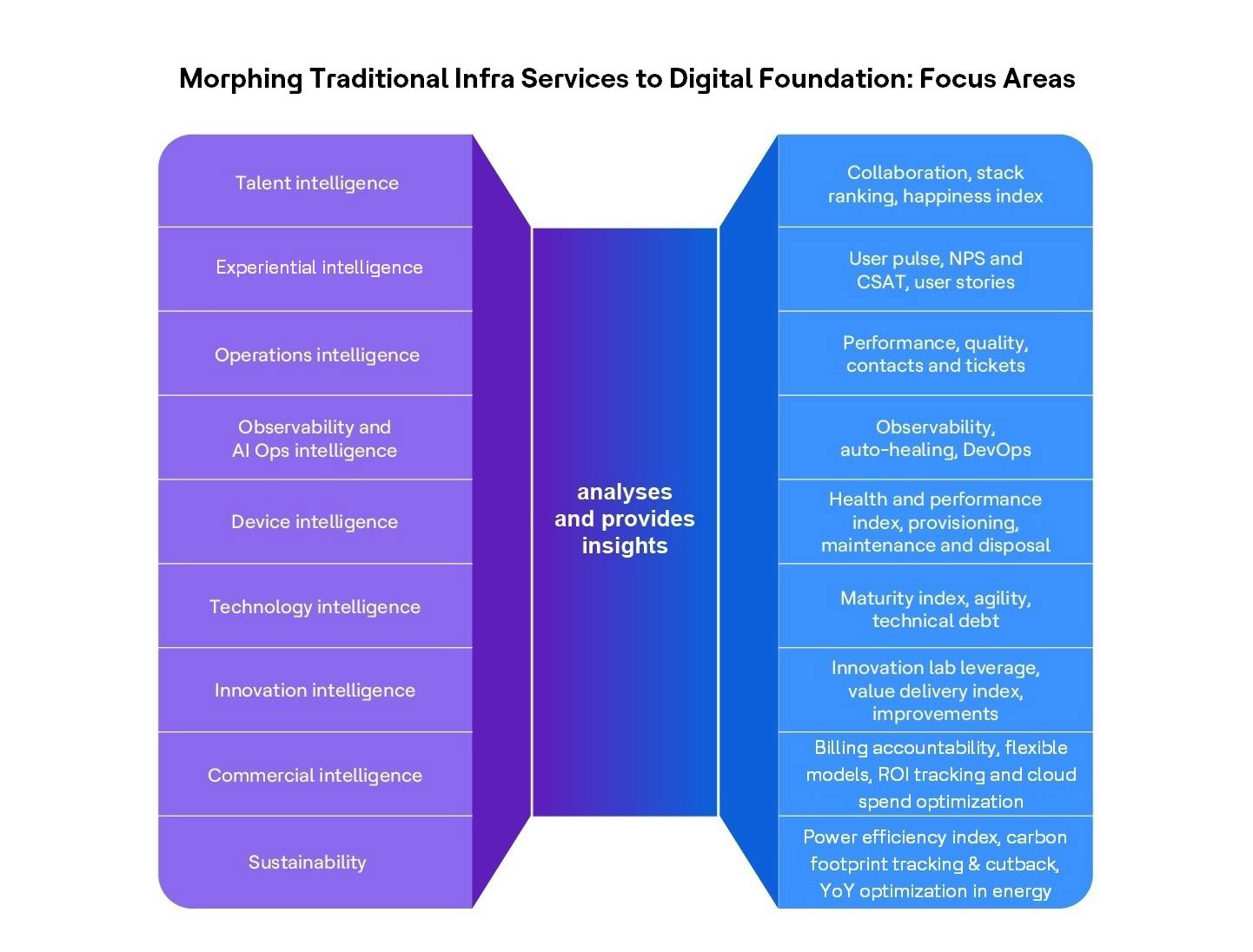Humans produce almost five quintillion bytes of data daily. Collecting and correlating it effectively is necessary to create value. Data-driven intelligence has proven to be reliable and offers accurate predictions and insights, unlike intuition-based decision-making, which might waste time and resources. There are brilliant use cases around data-driven intelligence on the business side, enabled by IT applications. However, such application in the IT infrastructure and platforms universe is quite low, across industries. Fortunately, more customers are realizing the benefits of a data-driven approach for achieving a digital, lean, agile, UX-led and resilient IT Infrastructure. The graphic below shows some of the outcomes that customers gain with this approach:

Operational and technical teams working in silos prevent enterprises from fully benefiting from data intelligence. However, some organizations are realizing the advantages of machine learning (ML), data science, pattern identification and data intelligence in the IT infrastructure space thanks, in large part, to the cloud-native easy access to these technologies.
Data-driven Intelligence in every area of Digital Foundation
By the end of 2024, Gartner predicts that more than 75% of enterprises will operationalize artificial intelligence (AI), leading to a five-fold increase in data streaming and analytics infrastructure. This validates the decision of many IT leaders to adopt a data-driven approach to business. However, a strategic alignment that makes data a viable differentiator - Data intelligence, has been missing. If managed well, it can deliver exceptional results and support end-to-end infrastructure service improvement. Here are the focus areas and examples of a data-driven Digital Foundation of an enterprise.

- Talent intelligence is crucial for any enterprise, as talent is the cornerstone of success. It helps to measure productivity, collaboration levels, stack ranking and the overall happiness of both internal and co-sourced teams. These are essential factors for developing skills and enhancing employee retention.
- Experience intelligence uses employee analytics, workplace data and sentiment analysis to create rewarding employee experiences. Gathering data from various feedback sources such as ticket resolution surveys, chatbots, CSAT scores and end-user tracking data in real-time enables enterprises to make informed decisions that strengthen engagement and morale.
- Operations intelligence uses a wide range of operational data such as performance and quality metrics. Analyzing outcomes, SLAs, KPIs and other operations analytics can provide valuable insights to improve operational efficiency.
- Observability and AI ops intelligence involves collecting, visualizing and applying intelligence to metrics, events, logs and traces for a holistic understanding of the entire environment. By providing end-to-end visibility, observability aligns operational KPIs with business goals, prioritizes user experience and aids in performing critical services. Data analysis also facilitates the prediction and prevention of incidents, promotes process quality and agility, and reduces the time required for incident detection and resolution.
- Device intelligence offers visibility into the working state of assets across offices over a longer period and greater control over the asset lifecycle. Connected devices facilitate end-user experience analysis, device health performance monitoring, and maintenance.
- Technology intelligence tracks the existing IT infrastructure's maturity index and provides insights to support obsolescence, upgrade planning, enterprise agility and technical debt reduction.
- Innovation intelligence offers insights into what is working and what is not for an organization. It tracks the value delivery index (VDI) and allows enterprises to focus on key areas of their innovation teams and labs, optimizing resource allocation in the long run.
- Commercial intelligence spans monthly billing accountability, industry benchmarking, effective ROI tracking, flexible billing models and resource units, and optimizing cloud spend. HCLTech's AI-driven cloud cost visibility and insights product, HCL MyXalytics FinOps, effectively visualizes, manages and optimizes multi-cloud spend.
- Sustainability deploys a technology-enabled sustainability framework to derive data-driven intelligence. It includes building a unified data model for real-time energy consumption and GHG emissions tracking. AI-powered advanced analytics turn this data into actionable insights for carbon footprint reduction and to improve corporate performance's bottom line through energy cost savings.
A three-step methodology to establish a data-driven Digital Foundation
- Employing a structured approach towards sourcing, organizing and establishing a data cloud platform, such as HCLTech CloudSmart.
- Engineering a sustainable data management ecosystem, such as HCLTech's Digital Foundation using transformative insights and tools to harness the right data and support, along with the required integrations.
- Developing an optimized system for predictions, analytics and dashboard-powered decision-making for positive business outcomes.
Creating a data-driven IT infrastructure
Creating a strong Digital Foundation for an enterprise calls for a solution suite that includes accelerators, use cases, best practices, professional expertise, streamlined processes and complementary tools. This suite must focus on all aspects, from customer journeys to value creation, and should be backed by data intelligence.
Using AI to analyze and turn data into actionable insights is crucial for success. Otherwise, it will be difficult to pull the right levers to lay and consolidate a future-proof Digital Foundation.

 Listen to article
Listen to article



